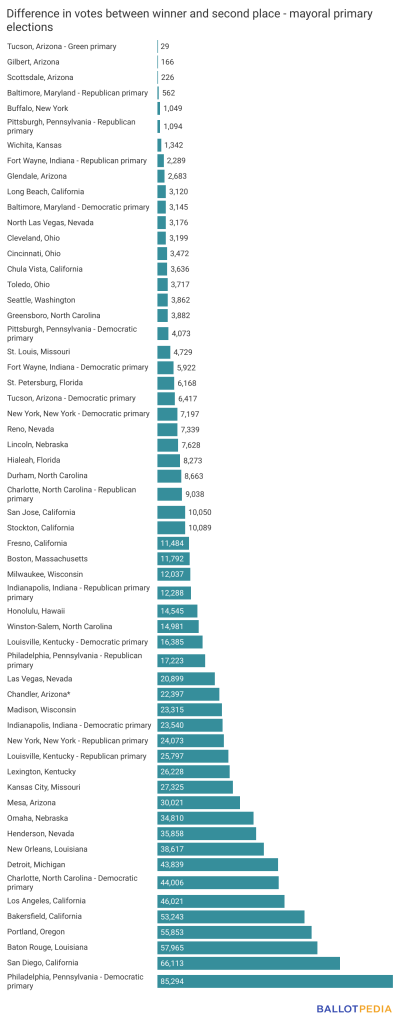As Ballotpedia prepares for August’s mayoral elections, we wanted to pause and take a look at some trends we’ve noticed across the top 100 largest cities by population. Analyzing each city’s most recent mayoral election results, ranging from 2019 to 2023, we found that the top five competitive general elections were decided by fewer than 1,000 votes, with Aurora, Colorado, being the most competitive with 214 votes separating first and second place. Here were the four other most competitive elections: Greensboro, North Carolina (425); Arlington, Texas (646); Oakland, California (677); and Austin, Texas (886).

Primary elections were even more competitive. The four most competitive were also decided by fewer than 1,000 votes, with the Green Party primary in Tucson, Arizona, being decided by 29 votes. Here were the three other most competitive mayoral primaries: nonpartisan primary in Gilbert, Arizona (166); nonpartisan primary in Scottsdale, Arizona (226); and Republican primary in Baltimore, Maryland (562).

From 2019 to 2023, 63 incumbents ran for re-election as mayor. Of those 63, nine lost re-election. The closest general election featuring an incumbent was in Greensboro, North Carolina, with Nancy B. Vaughan (D) winning by 425 votes. The next four closest elections were in Arlington, Texas (Incumbent Jim Ross winning by 646 votes), Garland, Texas (Incumbent Scott LeMay (R) winning by 4,661 votes), Wichita, Kansas (Incumbent Jeff Longwell (R) losing by 5,205 votes), and Lincoln, Nebraska (Incumbent Leirion Gaylor Baird (D) winning by 6,668 votes).
The closest primary election featuring an incumbent was in Buffalo, New York, with India Walton beating Incumbent Byron Brown by 1,049 votes in the Democratic primary. Brown would go on to defeat Walton in the general election as a write-in candidate. The next closest election was in Wichita, Kansas, with Incumbent Jeff Longwell earning 1,342 more votes than Brandon Whipple (D) in the nonpartisan primary. Both moved onto the general election, with Whipple defeating Longwell by 5,205 votes. The next three closest elections were in the nonpartisan primary in Glendale, Arizona (Incumbent Jerry Weiers (R) winning by 2,683), the nonpartisan primary in Toledo, Ohio (Incumbent Wade Kapszukiewicz (D) earning 3,717 more votes than Carty Finkbeiner (D), with both moving onto the general and Kapszukiewicz winning by 13,684 votes), and the nonpartisan primary in Greensboro, North Carolina (Nancy B. Vaughn earning 3,882 more votes than Justin Outling, with both moving onto the general and Vaughn winning by 425 votes).
The next mayoral election in the 2023 election cycle is Nashville’s general election on Aug. 3.
Learn More






